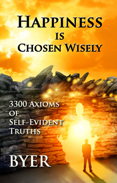
 |
This book examines numerous topics with the goal of teaching others how to find and experience happiness in life. Chapters such as “Desire and Fear,” “Human Nature,” “Society,” “Truth,” “Harmony,” “Simplicity,” and “Wisdom” are filled with one or two sentences for each axiom. The strength of the book lies in the chapters on nature, aloneness, peace, and enlightenment, for they offer significant wisdom. At any point, the reader can pick up the book and read any axiom, any page, or any chapter to help along the path toward happiness. Examples of the axioms include: “Alone is all-one, a peaceful, tranquil, quiet answer to life” and “To fear you will be feared; to hate you will be hated; to love you will be loved.”
There is an interesting combination of Ayn Rand philosophy and Buddhist beliefs. Examples include: “All attachment to desire or fear is suffering” (Buddhism) while “Marriage is a function of becoming slaves to our desire for pleasure and fear of pain” or “We should not allow society to govern our thinking because that’s not free thinking” is pure Ayn Rand. Likewise, it focuses on the intellect as superior to feelings instead of a dialectical concept of both intellect and feelings. The exception to the problem of feelings is that of happiness, the one true feeling. This is shown in these axioms: “We are led by our emotions or we lead by our thinking” and “What we feel is not important, but what we think is.”
No matter how one views this work, it’s easy to see that the author writes with conviction about his beliefs, even if at times it seems as if the work contradicts itself. But these contradictions can be an excellent way to work through one’s own convictions and possibly grow with such exploration.